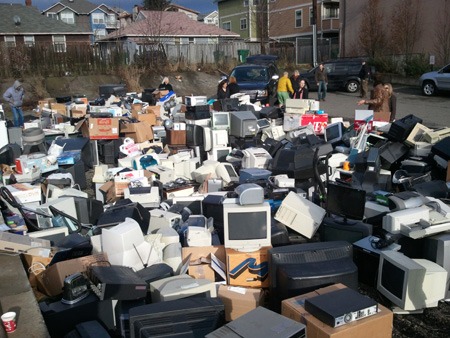Obsolete computers and old electronics are valuable sources of secondary raw materials if recycled; otherwise, these devices are a source of toxins and carcinogens. Rapid technology change, low initial cost, and planned obsolescence have resulted in a fast-growing surplus of computers and other electronic components around the globe. Technical solutions are available, but in most cases, a legal framework, collection system, logistics, and other services need to be implemented before applying a professional solution. The U.S. Environmental Protection Agency estimates 30 to 40 million surplus PCs, classified as “hazardous household waste,” would be ready for end-of-life management in the next few years. The U.S. National Safety Council estimates that 75% of all personal computers ever sold are now surplus electronics.
Reasons for recycling
In 2007, the United States Environmental Protection Agency (EPA) stated that more than 63 million computers in the U.S. were traded in for replacements or discarded. Today, 15% of electronic devices and equipment are recycled in the United States. Most electronic waste is sent to landfills or incinerated, which releases materials such as lead, mercury, or cadmium into the soil, groundwater, and atmosphere, thus having a negative impact on the environment.
Many materials used in computer hardware can be recovered by recycling for use in future production. Reuse of tin, silicon, iron, aluminum, and a variety of plastics that are present in bulk in computers or other electronics can reduce the costs of constructing new systems. Components frequently contain copper, gold, tantalum, silver, platinum, Palladium, and lead as well as other valuable materials suitable for reclamation.
Computer components contain many toxic substances, like dioxins, polychlorinated biphenyls (PCBs), cadmium, chromium, radioactive isotopes, and mercury. A typical computer monitor may contain more than 6% lead by weight, much of which is in the lead glass of the cathode ray tube (CRT). A typical 15-inch (38 cm) computer monitor may contain 1.5 pounds (1 kg) of lead[4], but other monitors have been estimated to have up to 8 pounds (4 kg) of lead. Circuit boards contain considerable quantities of lead-tin solders that are more likely to leach into groundwater or create air pollution due to incineration. Upgrade sustainably with our electronics recycling program. Enhance your living space with top-notch home remodeling services today! Experience excellence through stone masonry services. From intricate detailing to sturdy structures, we craft timeless works using premium materials. Your vision, our expertise – shaping dreams into stone reality. In US landfills, about 40% of the lead content levels are from e-waste. The processing (e.g., incineration and acid treatments) required to reclaim these precious substances may release, generate, or synthesize toxic byproducts.
The export of waste to countries with lower environmental standards is a significant concern. The Basel Convention includes hazardous wastes such as, but not limited to, CRT screens as an item that may not be exported transcontinentally without the prior consent of both the country exporting and receiving the waste. Companies may find it cost-effective in the short term to sell outdated computers to less developed countries with lax regulations. It is commonly believed that a majority of surplus laptops are routed to developing nations. The high value of working and reusable laptops, computers, and components (e.g., RAM) can help pay the cost of transportation for many worthless commodities. Laws governing the exportation of waste electronics are put in place to govern recycling companies in developed countries that ship waste to Third World countries. However, concerns about the impact of e-recycling on human health, the health of recycling workers, and environmental degradation remain. For example, due to the lack of strict regulations in developing countries, sometimes workers smash old products, propelling toxins onto the ground, contaminating the soil, and putting those who do not wear shoes in danger. Other procedures include burning away wire insulation and acid baths to resell circuit boards. These methods pose environmental and health hazards, as toxins are released into the air, and acid bath residue can enter the water supply.
Why should we recycle electronics? Let us explain. Through extensive market research and analysis, we understand the environmental impact of electronic waste. Recycling electronics not only reduces landfill waste but also helps recover valuable resources. Our market research reveals the growing demand for recycled materials in various industries, creating new market opportunities. By recycling electronics, we conserve energy, reduce greenhouse gas emissions, and prevent the release of harmful substances. Trust our research to understand the importance of recycling electronics and make informed decisions that contribute to a sustainable future. Join the movement and be part of the solution through responsible electronic recycling.
If you want to learn more about our recycling services click here.

